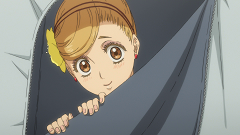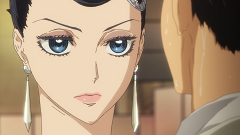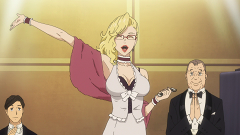I spent the majority of the previous review breaking down a single scene, so let’s play catch-up for a bit. This episode features the Tenpei Cup, an annual event held by some rich dance enthusiast. Despite not being an official competition, the stakes are high: if the fledgling pair of Tatara and Mako can outplace Gaju and Shizuku (who are favored to win), Gaju will be forced to take back his sister as his partner. Thankfully, Sengoku has given his full support to his new student, having supplied him with a new tailcoat and a strategy to impress the head judge during the Quickstep round. It’s a relief that Sengoku has quit trying to embarrass and discourage the impressionable Tatara, who needs all the support he can get, given his lack of self-confidence.
Regarding that timid streak, this episode didn’t bring it across as well as the last one. During his previous phone call with Mako, we got a clear picture of how unworthy Tatara felt, both as a dancer and as a young man. This time, he was a simple scaredy-cat, begging his coach not to put him back on the floor after nearly every round, then finding his groove again once the dancing started. I get that the major story of Ballroom is Tatara’s journey to find himself, but we don’t need a miniature version of that arc every six minutes. The show even commented on this practice through Sengoku, who quickly became fed up with what he described as a “rollercoaster mentality.” It’s good that the writers aren’t totally clueless, I guess, but the show’s awareness of the problem doesn’t make it any less boring to watch.
Thankfully, the episode really picked up during its second half, especially after a dance floor collision between Tatara and Gaju. We never got a definitive answer on whether Tatara purposely engineered the crash, but after he watched Gaju and Shizuku steal the show during the second round, I’m choosing to believe that he made a conscious decision to level the playing field by drawing attention to himself. The waiting room confrontation that ensued was highly dramatic, with all the yelling, punching, and crying that you expect from shounen anime. I liked almost everything about it, though. Gaju is a very believable villain, whose insensitivity and tendency to belittle others read like those of a real high schooler. When Mako hits him and runs off crying, it’s at the perfect point in the conversation. My favorite part of the scene, though, came immediately afterward.
When Shizuku sees her teary-eyed competitor flee the scene and asks what all the fuss is about, it comes out that Tatara thinks there’s a chance that Mako will surpass her. At this point, I fully expected the older girl to berate Gaju for mistreating his totemo kawaii imouto~ and run off to make sure Mako was okay, at which point we’d get a scene where the girls talk about how boys are stupid. Instead, Shizuku walks right up to Tatara, gives him an icy stare, says, “Don’t underestimate me,” snaps his bowtie, and walks away. I think I’m in love. After receiving precisely zero speaking lines in last week’s script, Shizuku was due for her moment in the spotlight, and she certainly got it here. Part of me hopes that she still checked on Mako after she was through being a badass, but the version of the argument that we got was the best possible way the scene could have played out.
The story wraps with the introduction of Marisa Hyodo, mother of Tatara’s destined rival. Before she was revealed as a guest judge for the semifinals of the Tenpei Cup, we got a car scene between Marisa and Kiyoharu, who don’t seem to be the closest of parent-child duos. As we might expect from a superstar of the dance world, she works constantly and doesn’t see much of her son, but what’s worse is that she rationalizes her absence by declaring him the type who “likes being alone.” Ballroom is full of parents and authority figures who are less supportive than they ought to be, although I suppose it wouldn’t be anime if it weren’t. When the Hyodos appear at the very end of the episode, Sengoku looks like a kid who’s been caught with his hand in the proverbial cookie jar – does he have an agreement with Marisa not to train anyone except her son, or is there some history between them that we don’t know about? Guess we’ll find out next week.




